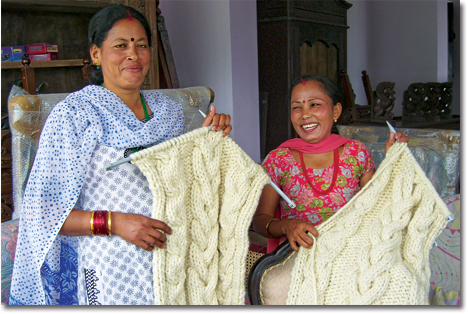Turning Handicrafts into Opportunity
When I was little, I always wondered what it would be like to be an Eskimo, to really live that life—to put myself in their shoes,” says Susan Yacubian Klein ’64.
Perhaps unsurprisingly, Klein ended up majoring in sociology, a course of study that led to a job working with international students while raising her family in Princeton, New Jersey. Her work involved helping the students adapt to American culture, which made her realize that she wanted to experience other cultures at a deeper level than just as a visitor. “I knew I understood how to work with other cultures,” Klein says, “but I needed to have something specific to do.”
While searching for such a project, Klein learned about an organization called Aid to Artisans, which helps create economic opportunities for traditional crafts people around the world. Around the same time, she learned about the Time-Out Grant, an anonymously endowed grant for Vassar alumnae/i over the age of 40 “who wish to make a career change or to take time out to pursue a strongly desired endeavor, but lack the financial resources to do so.” Klein applied for the grant with a proposal outlining her desire to work in Armenia on a crafts project — and got it.
In 1993, Klein began her Time-Out Grant adventure in the newly independent Republic of Armenia, which had been a part of the Soviet Union until 1990. But after a terrible earthquake in 1988, and a war with neighboring Azerbaijan, “there was limited electricity and hot water,” she says. “In fact, there was very little of anything.” Under such severe circumstances, she began her collaboration with Aram Sharambeyan, who, with his sister, Anoush, had founded the Armenian Craft Enterprise Center. “They were trying to help artisans make a living after a complete collapse of the economy,” says Klein. Many Armenians had traditional craft skills, she says, but no market for their creations. “We would meet in his car because the heat worked there and nowhere else,” Klein recalls. Sharambeyan asked Klein what she could do to help. “I don’t know,” she remembers telling him, “but we will figure it out as we go along.”
With Klein’s help and her understanding of grant writing, specialty markets, and quality control, the Sharan Crafts Center, as it is now known, got off the ground. The center is thriving as an exporter of children’s knitwear; it employs over 600 women.
The Time-Out Grant, since its inception in 1989, has helped nearly 20 Vassar alumnae/i change their lives. But Klein’s career has actually been transformed by a second program for Vassar graduates. In 2006, Klein convinced her brother Robert to accompany her on an AAVC trip to India. While on the tour, Klein struck up a friendship with the tour leader, Rachna Dushyant Singh, who had started a crafts project called the Agency for Non Konventional Urban Rural Initiatives, or ANKURI, in the hills of the Himalayas to help craftswomen in remote rural communities connect their knitting handicrafts to niche markets in India. Singh used her income as a tour guide to support her fledgling organization.

Susan Yacubian Klein '64 (top) helps local artistans in India and Armenia connect to wider markets.
(Above) craftswomen share a laugh while making sweaters destined for such high-end retailers as FabIndia.
At that point, Klein had worked for 13 years in Armenia—after the Sharan Crafts Center was on its feet, Klein also worked with Armenia Tree Project, an environmental organization—and Singh’s project seemed like a perfect fit for Klein’s interests and abilities. “All of the signs were unfolding infront of my eyes,” she says. “I told Rachna I would come back to help her, something she had heard many times before from people on tours who were interested in her venture.” Perhaps Singh didn’t expect anything to come of it—“but she didn’t know me,” says Klein. Soon Klein had a place to stay in New Delhi, five hours south of the city of Dehradun, in the Indian state of Uttrakhand, where ANKURI is based.
The work Klein does in India is very similar to her work in Armenia, connecting local artisans with wider markets for their creations. In Armenia, Klein recognized that the products needed to be exported to other countries; in India, however, the markets are domestic. ANKURI has connected regional craftswomen with the leading Indian chain of high-end stores, FabIndia, which now sells their handcrafted products. Also drawing on her Armenian experience, Klein has helped ANKURI develop an education component, a health component, and an extensive program of volunteer opportunities.
Klein currently divides her time between the United States, Armenia, and India. “It is a real privilege to be able to live in other cultures,” she says. “I’ve gained so much!” After Armenia and India, perhaps there’s still another opportunity in store for her farther north, working with the Eskimos.
—Diane Asadorian Masters '80
Photo Credit: Rachna Dushyant Singh
Have comments about this article? Email vq@vassar.edu
